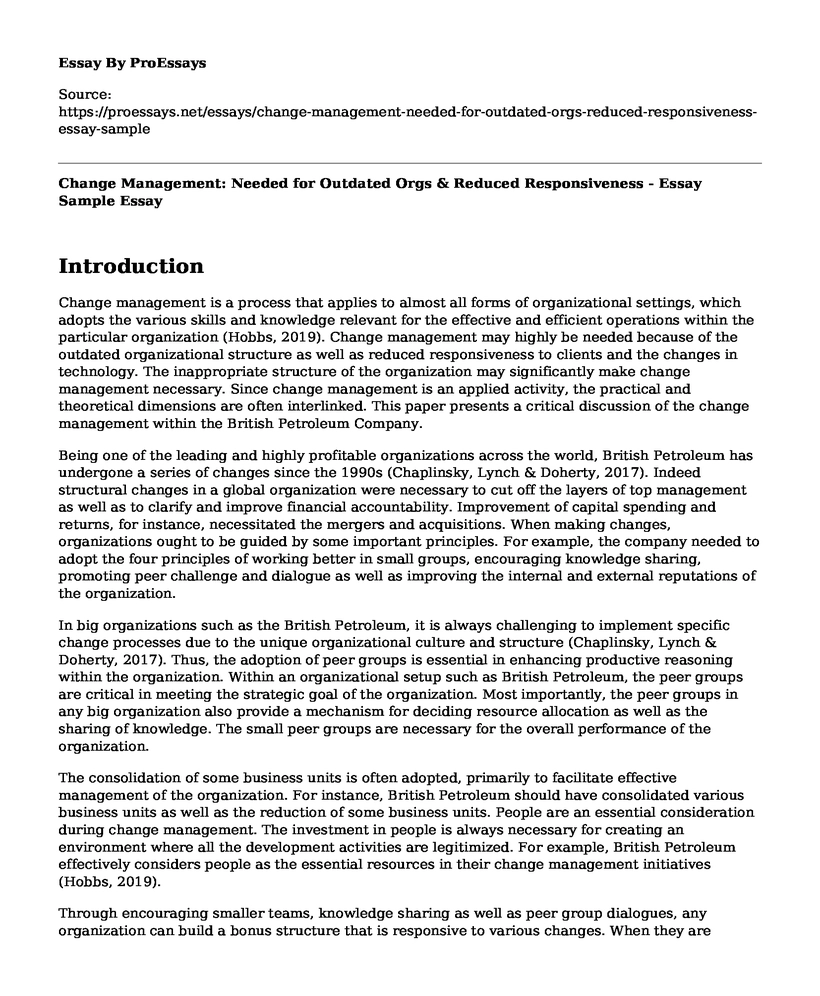Introduction
Change management is a process that applies to almost all forms of organizational settings, which adopts the various skills and knowledge relevant for the effective and efficient operations within the particular organization (Hobbs, 2019). Change management may highly be needed because of the outdated organizational structure as well as reduced responsiveness to clients and the changes in technology. The inappropriate structure of the organization may significantly make change management necessary. Since change management is an applied activity, the practical and theoretical dimensions are often interlinked. This paper presents a critical discussion of the change management within the British Petroleum Company.
Being one of the leading and highly profitable organizations across the world, British Petroleum has undergone a series of changes since the 1990s (Chaplinsky, Lynch & Doherty, 2017). Indeed structural changes in a global organization were necessary to cut off the layers of top management as well as to clarify and improve financial accountability. Improvement of capital spending and returns, for instance, necessitated the mergers and acquisitions. When making changes, organizations ought to be guided by some important principles. For example, the company needed to adopt the four principles of working better in small groups, encouraging knowledge sharing, promoting peer challenge and dialogue as well as improving the internal and external reputations of the organization.
In big organizations such as the British Petroleum, it is always challenging to implement specific change processes due to the unique organizational culture and structure (Chaplinsky, Lynch & Doherty, 2017). Thus, the adoption of peer groups is essential in enhancing productive reasoning within the organization. Within an organizational setup such as British Petroleum, the peer groups are critical in meeting the strategic goal of the organization. Most importantly, the peer groups in any big organization also provide a mechanism for deciding resource allocation as well as the sharing of knowledge. The small peer groups are necessary for the overall performance of the organization.
The consolidation of some business units is often adopted, primarily to facilitate effective management of the organization. For instance, British Petroleum should have consolidated various business units as well as the reduction of some business units. People are an essential consideration during change management. The investment in people is always necessary for creating an environment where all the development activities are legitimized. For example, British Petroleum effectively considers people as the essential resources in their change management initiatives (Hobbs, 2019).
Through encouraging smaller teams, knowledge sharing as well as peer group dialogues, any organization can build a bonus structure that is responsive to various changes. When they are integrated into the organizational change management system, the three principles of managing change can promote the functioning of various business units within the organization; a fact that was eminent in the 2001 change within British Petroleum.
The organizational change at British Petroleum was essential due to several factors. For instance, management change is generally crucial in building competition among other companies. It was also necessary for developing customer satisfaction as well as enhancing technological advancements within the organization (Chaplinsky, Lynch & Doherty, 2017). Most importantly, change is so essential for any organization (including British Petroleum), that without it, the organization is likely to lose competitive advantage. In conclusion, change is a continuous mechanism of process redesign and shows a significant opportunity for a company's reorganization and renewal necessary for achieving a competitive advantage.
References
Chaplinsky, S., Lynch, L. J., & Doherty, P. (2017). British Petroleum, Ltd. Darden Business Publishing Cases. Retrieved from https://doi.org/10.1108/case.darden.2016.000051
Hobbs, G. (2019). British Imperialism and Oil: A History of British Petroleum, 1901-2016 (Doctoral dissertation, SOAS University of London).
Cite this page
Change Management: Needed for Outdated Orgs & Reduced Responsiveness - Essay Sample. (2023, Jun 08). Retrieved from https://proessays.net/essays/change-management-needed-for-outdated-orgs-reduced-responsiveness-essay-sample
If you are the original author of this essay and no longer wish to have it published on the ProEssays website, please click below to request its removal:
- Essay Sample on Managing Organizational Culture
- Research Paper on Mark Zuckerberg
- Essay Example on Social Stratification: Who Gets Access to Resources?
- Project Proposal for Increase the Profits and Augment the Product Portfolio of the Seamus Company
- Leadership Beyond the Physical: A Review of Spiritual Leadership - Essay Sample
- Essay Example on Overcoming Procrastination: The Keys to Academic Success
- Essay Example on Data Breach at Trexpendition: Risks and Solutions







